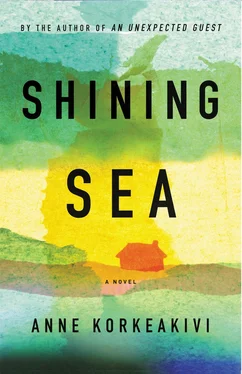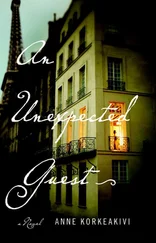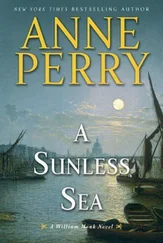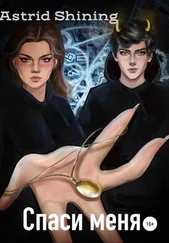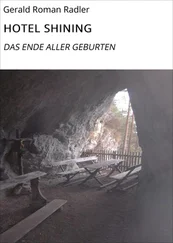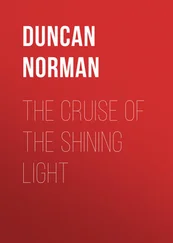“Maybe you should call someone, Mom,” Mike Jr. says.
Call someone? Whom? There is only she.
“I’ll go see about Patty Ann,” Jeanne says. “You just sit.”
So, so heavy. The baby is grinding down against her pelvis again. Stop that! Not now! Not already! “That’s okay, Jeanne. I have to get up to look for Francis anyhow.”
“Patty Ann is talking to the police,” Molly announces, pointing.
“What?” She and Jeanne swivel in the direction of Molly’s finger.
There on the front step is Patty Ann, the powder on her face streaked with tears, speaking with a young police officer.
She hoists herself to her feet, Jeanne rising beside her. “What’s going on?” she says, bracing herself with a hand on the doorjamb. She looks past Patty Ann and the officer to the street, at the mourners getting into their cars or walking home along the sidewalk. And at the curb in front, a police car, the back door open. Francis stands beside it, held firmly in place by a second police officer.
“Oh, no,” Jeanne says.
Francis looks a little dusty, a little embarrassed. No blood, no bruises.
“Oh, for Pete’s sake,” she says, relief warming her face and hands.
“We found your son, ma’am, at the bus station,” the young officer says, looking back and forth between her and Jeanne. “He won’t say how he got there. He wouldn’t say where he was trying to go, either. That is your son? One of you is Mrs. Michael Gannon?”
The bus station? “Oh, Francis!”
Francis looks down at his feet. A smudge of dirt shadows his delicate cheekbone.
“Yes,” she says. “That’s my son. I’m sorry, officer.”
“Ma’am—” the officer begins.
“Oh, leave her alone,” Luke says. “My dad just died, okay? This is his wake.”
“Luke! Don’t speak to the officer that way.”
The young policeman glances at her stomach, looks at Luke and then at Mike Jr., Patty Ann, and Molly. Then he looks at Francis. “My condolences, ma’am.”
“She’s not mine,” she says reflexively, of Molly.
“Excuse me?” the police officer says.
“Oh, never mind.” She smothers a sob.
“Here, Mom,” Patty Ann says, handing her a soiled tissue.
“No, no,” she says, extracting the handkerchief from within her shirtsleeve.
The other police officer releases Francis. He shuffles toward the house, still avoiding her eyes, as the policemen get back into their car.
“I’m sorry,” he says.
“Where, Francis?” she says, touching his thin shoulder.
He scuffs the ground. “Nowhere.”
“All right.” Because what else is she supposed to say? Because how could he run away right now, just when the going gets tough? Because who wouldn’t want to run away from this — but how is it conceivable that one of Michael’s children would? Michael never ran away from anything in his life. Not running away was Michael. She lets her hand drop. There’s going to be work ahead. “Okay. Get into the house now.”
The kids file back into the house, Luke following Patty Ann and Mike Jr., Francis following Luke. Molly brings up the rear. This is what it will look like tomorrow, she thinks. All of them behind Michael’s casket.
She stops in front of the open door, breathes deeply.
“What will you do?” Jeanne asks in a soft voice.
“That,” she says, “is the question.”
Not today. Not tomorrow. But the day after. And every day after that.
A Marriage / August 26, 1965 Francis
FRANCIS STIRS HIS FINGERS through the sand, combing for flat pebbles. It’s not so hot as it has been, and the sudden cool feels like a billboard announcing the first day of school. He’ll be turning east up Brookhaven, in the opposite direction from the beach, come Monday morning. Another nine and a half months cooped up in a classroom.
“Let’s go out onto the pier.”
Eugene shakes his head. “I don’t have any money.”
“Doesn’t matter. To look at the water.” They have the whole sea in front of them here on the beach, so he adds, “Let’s see if anyone’s caught anything.”
He needs to get up and move.
They drag their bikes through the sand, lean them against a pillar, and tie their tennis shoes around the handlebars. Then they look at each other and, without speaking, break into a sprint.
He hits the middle of the pier way ahead. It’s really not fair to race. After all, Eugene’s got the asthma.
“Here,” he says, pulling up short. “I’ll buy us Cokes.”
“Boss!” Eugene says, dropping his hands onto his knees beside him, panting.
“Ugh. Don’t say that.”
“Why not?”
“Cause it makes you sound like a candy-ass.”
The pier feels empty — they find no fishermen and none of the usual couples, either. Two or three tourists wander around looking sun-struck, although today’s almost cloudy. The whole beach is quieter than usual for an afternoon in August, especially for the last Thursday before school starts back up. People are keeping to themselves since that Negro neighborhood went crazy. Even his mom, whom nothing ever scares, told him not to wander too far from home when he left this morning. And not because she thought he might try to run away yet again.
There’s only enough change in his pocket for one soda. He pops the top and hands the bottle to Eugene. “Share?”
“Yeah.”
They lean their stomachs against the pier railing, passing the bottle back and forth between them. Up toward Pacific Palisades, surfers bob on the swells, little specks in the distance, like brightly colored seagulls. It takes more than riots to keep the surfers away.
“You think we should learn to surf?” Eugene says.
“Nope.”
“Why not?”
He shrugs. “I don’t dig the sea enough.”
“Oh, come on. Who doesn’t dig the sea? Well, except David Balfour.”
“Who?”
“You know. In Kidnapped, the summer book. The one we were supposed to read.”
“You read that? Since when do you do the summer reading?”
Eugene looks sheepish. “My mom made me.”
“Did she read it to you, too?”
Eugene punches him in the arm, but not hard. “It was a good book. Well, not that bad.”
They walk down toward the end of the pier. A collection of trawlers plows slowly through the Pacific a few miles out.
“What do you see?” Eugene asks, squinting. “With those eagle eyes of yours.”
The sun has made its way toward the horizon. It glints off the mast of one of the boats; there is action below, something being pulled onto the deck. The sun-way along the sea’s surface makes the water seem even darker, almost metallic.
“Nothing. Boats.”
He has better than twenty-twenty vision. Unlike Eugene, who has to wear glasses.
“Maybe I’ll become a sailor,” Eugene says, “when I leave school. Get out of here, see the world.”
“Not me, man. Being trapped out in the middle of the sea on a boat is about the worst thing I can think of.”
“That’s stupid. Worse than having your fingernails pulled out? Or being pinned above a bamboo plant until it grows right through you?”
“Shut up, Eugene.”
Eugene picks at a scab on his wrist. “I’m sorry. I didn’t mean to say that.”
He and Eugene never talk about the stuff that was done to prisoners of war in the Pacific. Some of the other boys at school do, though, trading the stories back and forth as though they were baseball cards.
A tern soars by, its sharp orange beak and feet narrowly missing their heads. It flaps its wings hard and dives. He takes one of the pebbles from his pocket and pitches it into the sea.
“If your father was alive,” Eugene says, “he could show us how to skip it.”
Читать дальше
